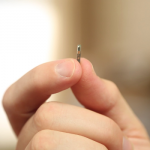A Wisconsin supplier of kiosks for employee break rooms is getting national attention in the wake of its announcement that it plans to implant radio-frequency identification microchips in the hands of volunteer employees Aug. 1, chips the company says will support payments.
Three Square Market, based in River Falls in the far western part of the state, says the chips, about the size of a grain of rice, will be implanted between the thumb and forefinger in a procedure that takes only seconds.

“Employees will be implanted with a RFID chip allowing them to make purchases in their break-room micro market, open doors, log in to computers, use the copy machine, etc.,” Three Square Market, also called 32M, said in a news release widely picked up by the general press. “This program, offered by 32M, is optional for all employees. The company is expecting over 50 staff members to be voluntarily chipped.”
The chips from Sweden-based BioHax International AB include near-field communication, the contactless technology used in mobile-payment services such as Apple Pay and Android Pay, as well as a relative handful of so-called dual-interface EMV credit and debit cards. BioHax’s home page proclaims the company is “turning the Internet of Things into the Internet of Us!”
The release gave few details about how the payments feature will work, and 32M did not respond to email and phone inquiries from Digital Transactions News. But the company believes implanted chips have a bright future in many use cases, including fare payments on public transportation.
“We foresee the use of RFID technology to drive everything from making purchases in our office break-room market, opening doors, use of copy machines, logging into our office computers, unlocking phones, sharing business cards, storing medical/health information, and used as payment at other RFID terminals,” 32M chief executive Todd Westby said in the release. “Eventually, this technology will become standardized, allowing you to use this as your passport, public transit, all purchasing opportunities, etc.”
But Rick Oglesby, a researcher who closely monitors new payments technology, questions the idea of implanted chips.
“Many emerging payment technologies struggle to gain consumer adoption due to fear and habitual momentum,” Oglesby, president of Mesa, Ariz.-based AZ Payments Group LLC, says by email. “The implant introduces whole new levels of both fear and friction, while at the same time there are a multitude of technologies that can provide a similar or even superior customer experience without implants. Payments won’t be and should not be the driver behind implanted chip adoption.”
Three Square Market says it became aware of what it calls “chipped employees” when it visited BioHax, one of its customers. 32M believes implanted chips in consumers could help boost sales at its so-called micro markets—kiosks that offer more product choices than traditional vending machines.
“We see chip technology as the next evolution in payment systems, much like micro markets have steadily replaced vending machines,” said Westby. “As a leader in micro-market technology, it is important that 32M continues leading the way with advancements such as chip implants.”
32M has said it won’t use the chips to track employees, according to media reports. The Aug. 1 implant event will be open to the press.





